PHUKET: Thirty-seven elephants on Phuket are to have their backgrounds checked amid a wildlife crusade that saw two baby elephants seized last night after failing DNA tests.
Hundreds of people gathered on Phuket's Big Buddha Hill at an elephant camp as one of the baby elephants, Popeye, was trucked away.
Overseeing proceedings last night was Damrong Phidet, Director-General of the Department of National Parks, Wildlife and Plant Conservation, who claimed earlier this year that elephant meat was ordered for the menus of restaurants in Phuket.
The taking of Popeye and another young elephant, Joey, comes amid loud editorialising for ''urgent action to protect endangered species, and to punish poachers and their business sponsors and patrons'' in an English-language national newspaper today.
Phuket now appears to be the centre of interest of the elephant investigators, although there has never been any evidence to support Khun Damrong's disputed claim that elephants have been eaten here.
Authorities under the direction of Federal Bureau of Investigation officers from Bangkok began looking last night at the paperwork associated with the first of the 37 elephants - and claim to have found discrepancies.
The elephant, ironically named Phuket, is 10 years old. More DNA tests are to be conducted on Phuket the elephant and other Phuket elephants.
Juvenile elephants Popeye, seized yesterday from Phuket's ATV Seaview On Tour, and Joey, taken from Phuket's Laguna Excursions, were alleged to have been stolen from wild elephant mothers.
Officials said they had the complete cooperation of the two companies, and of Siam Safari in connection with two other juvenile elephants that were under investigation.
Joey had been rented on a one-year contract from July 6 last year to July 5 this year, while Popeye's rent contract ran from August 24 last year to August 23 this year.
Young elephants seized in the wild do not have their DNA recorded, which is what the investigators say is the case with Joey and Popeye.
Unscrupulous animal smugglers kill the mothers in Thailand's national parks to steal their young, the authorities say.
A young elephant can fetch 900,000 baht or more. Officials say many of them are rented out to Phuket and other destinations in Thailand for the amusement of tourists.
The captive use of wild animals for the amusement of humans is more controversial than ever, with people on Phuket and elsewhere either taking delight in being with the creatures or condemning the practice.
Today's stern editorial in 'The Nation' reminds readers of the recent discovery of a slaughterhouse for tigers and other wild creatures in a central Bangkok building and goes on to urge speedy action before species are exterminated.
''Thailand simply needs to get tougher on wildlife poaching and those behind it, no matter how well connected they are,'' it says.
Some observers have questioned whether the elephants will be as well cared-for as they are in tourist-related environments on Phuket.
More than 180 registered elephants are used for tourist-related activities on Phuket with many more trekking in the neighboring provinces of Phang Nga and Krabi.
Hundreds of people gathered on Phuket's Big Buddha Hill at an elephant camp as one of the baby elephants, Popeye, was trucked away.
Overseeing proceedings last night was Damrong Phidet, Director-General of the Department of National Parks, Wildlife and Plant Conservation, who claimed earlier this year that elephant meat was ordered for the menus of restaurants in Phuket.
The taking of Popeye and another young elephant, Joey, comes amid loud editorialising for ''urgent action to protect endangered species, and to punish poachers and their business sponsors and patrons'' in an English-language national newspaper today.
Phuket now appears to be the centre of interest of the elephant investigators, although there has never been any evidence to support Khun Damrong's disputed claim that elephants have been eaten here.
Authorities under the direction of Federal Bureau of Investigation officers from Bangkok began looking last night at the paperwork associated with the first of the 37 elephants - and claim to have found discrepancies.
The elephant, ironically named Phuket, is 10 years old. More DNA tests are to be conducted on Phuket the elephant and other Phuket elephants.
Juvenile elephants Popeye, seized yesterday from Phuket's ATV Seaview On Tour, and Joey, taken from Phuket's Laguna Excursions, were alleged to have been stolen from wild elephant mothers.
Officials said they had the complete cooperation of the two companies, and of Siam Safari in connection with two other juvenile elephants that were under investigation.
Joey had been rented on a one-year contract from July 6 last year to July 5 this year, while Popeye's rent contract ran from August 24 last year to August 23 this year.
Young elephants seized in the wild do not have their DNA recorded, which is what the investigators say is the case with Joey and Popeye.
Unscrupulous animal smugglers kill the mothers in Thailand's national parks to steal their young, the authorities say.
A young elephant can fetch 900,000 baht or more. Officials say many of them are rented out to Phuket and other destinations in Thailand for the amusement of tourists.
The captive use of wild animals for the amusement of humans is more controversial than ever, with people on Phuket and elsewhere either taking delight in being with the creatures or condemning the practice.
Today's stern editorial in 'The Nation' reminds readers of the recent discovery of a slaughterhouse for tigers and other wild creatures in a central Bangkok building and goes on to urge speedy action before species are exterminated.
''Thailand simply needs to get tougher on wildlife poaching and those behind it, no matter how well connected they are,'' it says.
Some observers have questioned whether the elephants will be as well cared-for as they are in tourist-related environments on Phuket.
More than 180 registered elephants are used for tourist-related activities on Phuket with many more trekking in the neighboring provinces of Phang Nga and Krabi.

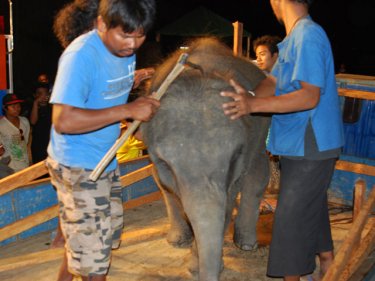
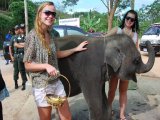
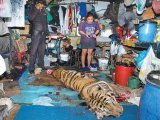
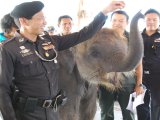

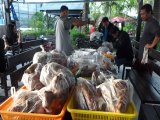
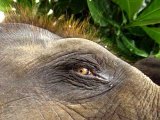
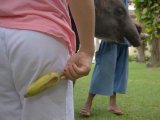

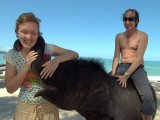



This is a good summation of the problem and of the ethical feelings of those who believe elephants should not be enslaved. It has been proven that sanctuaries are popular where just watching elephants go about their daily routines are fascinating enough, no circus performances needed. It is now up to Thailand's elephant owners to come to this realization and model more sanctuaries on the Elephant Nature Park which has been so successful with tourists. There at those sanctuaries elephants can naturally be attracted to one another and produce babies, babies who have other babies to play with and provide even more fascination for tourists. Thailand has the opportunity to lead the world in both animal tourism and conservation.
Posted by Tory Braden on February 28, 2012 23:05